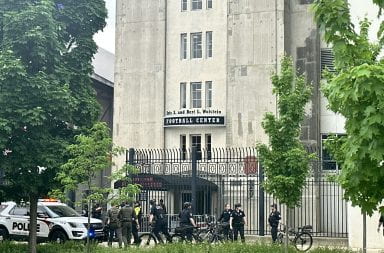
A recent study found that 25 percent of teachers surveyed were victims of physical or verbal violence at school. Credit: Courtesy of TNS
The safety of students and staff in school is at the forefront of political debates and news headlines. The effect of violence, specifically on teachers’ well-being, can impact the longevity of their careers and effectiveness of teaching, according to a recently published study in the Social Psychology of Education journal.
The data collected by a research task force, which included Ohio State personnel, found that of the 2,505 teachers’ responses, 25 percent were victims of physical or verbal violence at school and didn’t report the incident to administrators.
The task force, created by The American Psychological Association, the National Education Association and the American Federation of Teachers, was led by Eric Anderman, the chair of Ohio State’s Department of Educational Studies. The group found that even a smaller number of respondents — made up of K-12 teachers nationwide — spoke to a counselor about the incident.
“I think schools need to offer the help, and the more and more we talk about it and the more we realize that it’s a crisis, teachers may be more inclined to seek support,” Anderman said.

Eric Anderman, the chair of Ohio State’s Department of Educational Studies, led a task force that studied abuse and violence committed against teachers at schools. Credit: Courtesy of Ohio State
Of the teachers included in the research, 84 percent were female, a representative percentage for the field, according to U.S. Census data cited in the study.
Teachers were asked to write about the most upsetting incident they experienced at school where they were the target of verbal or physical aggression.
One-quarter of the teachers surveyed reported physical abuse or assault, and 37 percent shared instances of verbal insults, disrespectful language or inappropriate sexual advances.
The study examined the number of teachers who reported the incident, the level of self-blame reported, emotional responses to the abuse at school and the teacher’s response to it.
“The findings indicate that when teachers feel their own behavior is the cause of violence, they feel more guilty or embarrassed, and are less likely to talk about it,” said Narmada Paul, a doctoral candidate in educational psychology who helped with the study. “This points to the need for ensuring that the school’s administration can provide teachers a safe space for reporting these experiences without the burden of guilt.”
In an age when school violence is becoming increasingly alarming, the results are particularly concerning.
“I found it surprising that teachers’ reactions to experiences of violence in schools had not received the research attention it deserves up until now. Teachers are key to solving problems related to school violence,” Paul said. “That’s why our study is important.”
Anderman said a teacher’s willingness to discuss violence is particularly important because it can help troubled students be open about violence they experience.
“I think in general, when you listen to people talking about the Parkland shootings and some people coming out about how they thought this person may have been troubled,” he said. “It comes back to the same thing I’m saying: being able to talk about it.”


